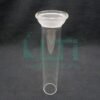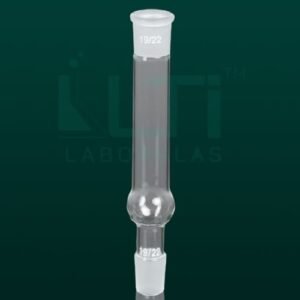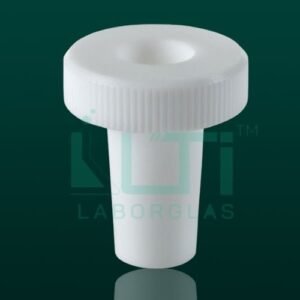- Complies with DIN 12264
| Part No. | CUP Joint (FEMALE)
| APPROX.BORE | LENGTH | Pack QTY |
| 1200-13 | S13 | 5 | 100mm | 10 |
| 1200-19 | S19 | 9 | 100mm | 10 |
| 1200-29 | S29 | 15 | 100mm | 10 |
| 1200-35 | S35 | 19 | 100mm | 10 |
| 1200-41 | S41 | 27 | 100mm | 10 |
Here are some potential uses for DIN/ISO spherical cup interchangeable glass joints in a laboratory setting:
- Chemical Synthesis: These joints can be used in chemical synthesis setups where different glassware components need to be securely connected for reactions, distillations, or other chemical processes. The spherical cup design allows for a stable connection.
- Distillation and Fractionation: In distillation and fractionation processes, where separation of components is crucial, DIN/ISO spherical cup joints can be employed to connect various glass components such as distillation columns, condensers, and receiving flasks.
- Laboratory Glassware Assembly: Researchers often assemble custom laboratory glassware setups for specific experiments. Spherical cup interchangeable joints provide flexibility to connect and disconnect various glass components easily.
- Vacuum Systems: In vacuum applications, DIN/ISO spherical cup joints are crucial to maintaining a vacuum-tight seal. This is essential in processes such as rotary evaporation or vacuum filtration, where a reliable seal is necessary to achieve the desired conditions.
- Research and Development: Laboratories engaged in research and development activities may use DIN/ISO spherical cup joints for prototyping and testing new equipment or setups. The interchangeability of these joints allows for experimentation and modification of configurations.
- Analytical Instrumentation: Some laboratory instruments and analytical setups may use spherical cup joints for connecting different components, ensuring precision and reliability in analytical techniques.
- Educational Laboratories: In educational laboratories, DIN/ISO spherical cup joints can be used for teaching purposes, as they allow students to assemble and disassemble glassware setups for various experiments and demonstrations.







